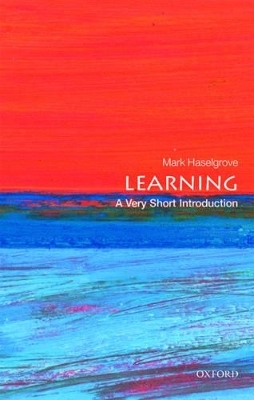
Learning
A Very Short Introduction
Seiten
2016
Oxford University Press (Verlag)
978-0-19-968836-4 (ISBN)
Oxford University Press (Verlag)
978-0-19-968836-4 (ISBN)
This Very Short Introduction looks at the nature of learning and how it takes place. From the early experiments of Pavlov, Thorndike, and others to the most recent studies in social learning, Haselgrove discusses learning in both humans and other animals.
What is learning? How does it take place? What happens when it goes wrong?
The topic of learning has been central to the development of the science of psychology since its inception. Without learning there can be no memory, no language and no intelligence. Indeed it is rather difficult to imagine a part of psychology, or neuroscience, that learning does not touch upon. In this Very Short Introduction Mark Haselgrove describes learning from the perspective of associative theories of classical and instrumental conditioning, and considers why these are the dominant, and best described analyses of learning in contemporary psychology. Tracing the origins of these theories, he discusses the techniques used to study learning in both animals and humans, and considers the importance of learning for animal behaviour and survival.
ABOUT THE SERIES: The Very Short Introductions series from Oxford University Press contains hundreds of titles in almost every subject area. These pocket-sized books are the perfect way to get ahead in a new subject quickly. Our expert authors combine facts, analysis, perspective, new ideas, and enthusiasm to make interesting and challenging topics highly readable.
What is learning? How does it take place? What happens when it goes wrong?
The topic of learning has been central to the development of the science of psychology since its inception. Without learning there can be no memory, no language and no intelligence. Indeed it is rather difficult to imagine a part of psychology, or neuroscience, that learning does not touch upon. In this Very Short Introduction Mark Haselgrove describes learning from the perspective of associative theories of classical and instrumental conditioning, and considers why these are the dominant, and best described analyses of learning in contemporary psychology. Tracing the origins of these theories, he discusses the techniques used to study learning in both animals and humans, and considers the importance of learning for animal behaviour and survival.
ABOUT THE SERIES: The Very Short Introductions series from Oxford University Press contains hundreds of titles in almost every subject area. These pocket-sized books are the perfect way to get ahead in a new subject quickly. Our expert authors combine facts, analysis, perspective, new ideas, and enthusiasm to make interesting and challenging topics highly readable.
Mark Haselgrove is an Associate Professor in the School of Psychology at the University of Nottingham. He conducts research and teaches on the principles, mechanisms and applications of learning. Along with Lee Hogarth, he is the co-author of Clinical Applications of Learning Theory (Psychology Press, 2012)
1: What is learning (and how do we study it?)
2: What is learned during learning?
3: The surprising thing about learning
4: Maps and clocks: Learning about space and time
5: When learning goes wrong
6: Learning from others
7: Surely there is more to learning than that
Further Reading
Index
| Erscheinungsdatum | 27.06.2016 |
|---|---|
| Reihe/Serie | Very Short Introductions |
| Zusatzinfo | 25 black and white halftones |
| Verlagsort | Oxford |
| Sprache | englisch |
| Maße | 117 x 174 mm |
| Gewicht | 104 g |
| Themenwelt | Sachbuch/Ratgeber ► Natur / Technik |
| Geisteswissenschaften ► Psychologie ► Allgemeine Psychologie | |
| Geisteswissenschaften ► Psychologie ► Pädagogische Psychologie | |
| Geisteswissenschaften ► Psychologie ► Verhaltenstherapie | |
| ISBN-10 | 0-19-968836-2 / 0199688362 |
| ISBN-13 | 978-0-19-968836-4 / 9780199688364 |
| Zustand | Neuware |
| Haben Sie eine Frage zum Produkt? |
Mehr entdecken
aus dem Bereich
aus dem Bereich
Techniken der Verhaltenstherapie
Buch (2024)
Julius Beltz GmbH & Co. KG (Verlag)
CHF 48,95


